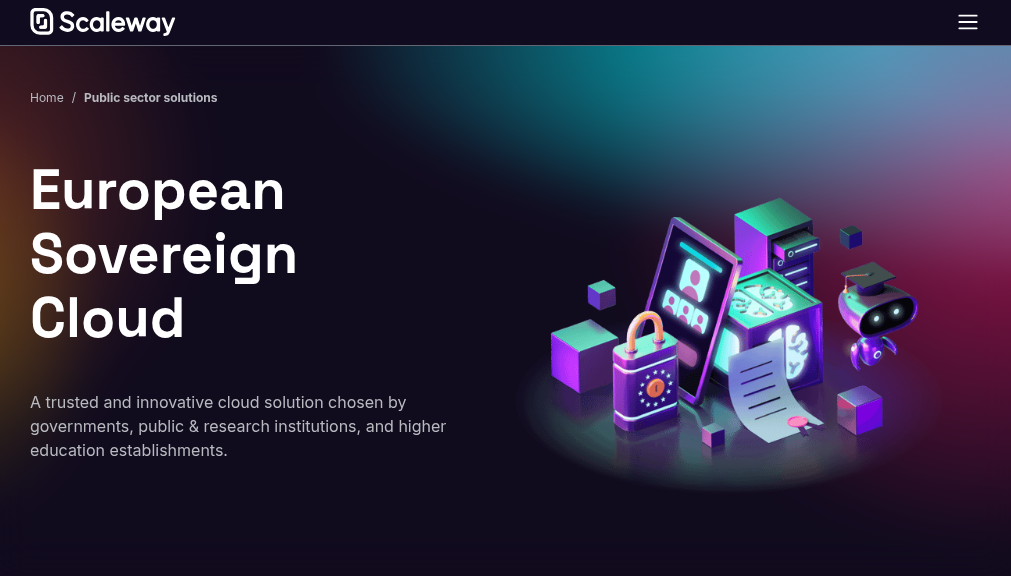In today’s rapidly evolving digital landscape, the demand for sovereignty, security, and ethical alignment in cloud infrastructure has never been greater. As AI becomes an integral part of enterprise and public-sector operations, choosing the right cloud provider is not just a technical decision—it’s a strategic one. Scaleway, a European cloud provider, stands out by offering sovereign infrastructure that aligns with open-source principles and European data protection laws. For teams deploying AI inference using open-source models, Scaleway presents a compelling alternative to hyperscalers.
What is Cloud Sovereignty—and Why Does it Matter?
Cloud sovereignty refers to the ability to maintain control over data and infrastructure according to the laws and standards of a specific country or region. For European organizations, this means ensuring data stays within the EU, is processed in accordance with GDPR, and is shielded from extraterritorial laws like the U.S. CLOUD Act. In essence, sovereign cloud infrastructure empowers organizations to retain autonomy over their digital operations.
Scaleway exemplifies this vision by offering data centers exclusively within Europe (France, Poland, and the Netherlands), full compliance with European regulations, and a commitment to open standards.
Scaleway: A European Cloud Built for AI
Scaleway has steadily built a reputation as an agile, developer-friendly cloud provider, offering an ecosystem of compute, storage, and networking services tailored to modern workloads. More recently, it has become a serious contender in the AI and machine learning space, thanks to:
-
High-performance GPU offerings for training and inference (NVIDIA A100s, H100s, and others),
-
Bare-metal instances for low-latency, high-security operations,
-
Kubernetes-native solutions, supporting scalable deployment patterns,
-
And crucially, transparent pricing and data residency guarantees.
This makes Scaleway a natural fit for teams looking to run open-source AI models like LLaMA, Mistral, Falcon, or BLOOM in a way that’s both performant and aligned with European values.
Open-Source AI on a Sovereign Cloud
The momentum behind open-source AI is undeniable. With models such as Mistral and LLaMA 3 offering competitive performance to closed alternatives, many organizations are exploring self-hosted inference solutions to avoid vendor lock-in and preserve data privacy.
Running these models on Scaleway offers several advantages:
-
Data Control: Sensitive data processed during inference never leaves EU jurisdiction.
-
Cost Predictability: Transparent pricing reduces the complexity and risk of cost overruns common with major providers.
-
Flexibility: You can deploy models on GPU or CPU instances, using your preferred stack—Hugging Face Transformers, ONNX Runtime, vLLM, or custom implementations.
-
Security & Compliance: Scaleway is ISO/IEC 27001 certified and designed to meet GDPR and NIS2 requirements, reducing compliance overhead.
For example, a startup developing AI-based legal document summarization tools using a fine-tuned Falcon model can deploy inference endpoints on Scaleway, ensuring that sensitive case data is never exposed to U.S.-based infrastructure or opaque telemetry pipelines.
Strategic Independence in the Age of AI
As geopolitical tensions grow and data localization becomes a priority, organizations are rethinking their cloud strategy. Using a sovereign provider like Scaleway is not about isolation—it's about independence. It allows you to:
-
Avoid over-reliance on U.S. tech giants,
-
Ensure alignment with European digital sovereignty initiatives (e.g., Gaia-X),
-
And foster a more ethical and sustainable digital ecosystem.
Final Thoughts
The future of AI in Europe will be shaped not only by algorithms but by infrastructure choices. Scaleway offers a viable, sovereign foundation for AI inference using open-source models—empowering teams to innovate with confidence, protect their data, and align with European values.
If your organization is building or scaling AI services, now is the time to consider where—and how—those models run. Sovereignty isn’t a limitation. It’s a superpower.


